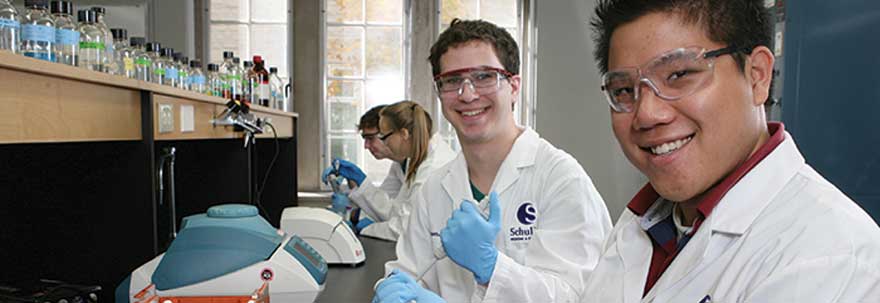Current Students
Program Information
First Year Report
All Master's students are responsible for composing a 3-4 page report, not to exceed 8,000 characters, that includes the following:
- Introduction of the Master's thesis project, emphasizing the key hypothesis to be tested
- Description of relevant background literature. This part should constitute one-third to one-half of the report (about 1.5 pages)
- Description and evaluation of procedures being used in the studies
- Presentation of any relevant results (where possible)
- Research direction
Timing
There should be two meetings in the first year of the MSc or direct-entry PhD program: one meeting held sometime within the first term, and the second meeting held within one month of completing the third term. These initial meetings should be followed by at least annual meetings. To provide the advisory committee sufficient time to review the report, the student should submit the report to committee members at least one week before the scheduled meeting. The student is responsible for setting up the committee meeting.
Evaluation
The report will be evaluated only by the student's advisory committee. No formal grade will be assigned to the report. The student will be expected to answer questions relevant to the report. A short summary of the strengths and weaknesses of the proposal will be provided to the student by each committee member. These summaries and a copy of the report will be kept in the student's file. If the advisory committee believes the report to be unacceptable, then the student will be clearly informed that significant improvement would be necessary for the qualifying exam and the principal supervisor should guide the student in upgrading the report to an acceptable level.
This written report is not meant to replace the qualifying exam, but to aid the student in his/her preparation. The scope of the report is significantly less than the qualifying exam, but after appropriate updating and revising, much of the report could be included as part of the qualifying exam.
The above information is also included in the Graduate Student Handbook.
Graduate Student Handbook
For detailed information on our graduate program please consult the following:
Department of Biochemistry's Graduate Student Handbook.
This handbook contains the following information:
- The School of Graduate and Postdoctoral Studies Requirements (roles and responsibilities of the program, supervisor, advisory committee, and student)
- Qualifying Exams
- Seminars
- Course Information
- Thesis Information
- First Year Reports
The Handbook also contains other contact information and useful links. If you have any questions regarding any Department/Faculty requirements, please contact the Graduate & Undergraduate Program Administrator.
Thesis Information (MSc and PhD)
Guidelines for the preparation and examination of MSc and PhD theses are provided by the The School of Graduate and Postdoctoral Studies.
Safety Information
For the most up-to-date information, please visit Required Training at Human Resources.
 Own Your Future
Own Your Future
If you’re a doctoral student, optimize your doctoral degree by taking advantage of Own Your Future (OYF). These workshops support you in your doctoral studies and enable you to be career-ready.
Own Your Future is:
- Self-directed – you participate as much or as little as you want
- Supported by a confidential Power Skills Assessment
- Designed to be relaxing and meaningful
- Developed and delivered by experts
Courses
Students in the PhD program must complete a total of 1.5 credits consisting of 0.25 seminar course + 5 other 0.25 credit courses. Courses should normally be from the 9000 level. If a student has transferred from the MSc program they may include the courses taken while in the MSc.
Students in the MSc program must complete a total of 1.0 credit consisting of 0.25 seminar course + 3 other 0.25 credit courses. Courses should normally be from the 9000 level, offered by the Biochemistry Department. With the agreement of the student's advisor/advisory committee and the Graduate Chair, one suitable course from another department may be used. Requests for a substituted course are to be sent to Megan Luckovitch (mluckovi@uwo.ca), the Graduate Program Administrator.
For continuing students, 0.5 credit courses taken previously will be counted towards their degree.
Courses offered Fall Term 2025
Biochem 9511
Biochem 9552
Biochem 9703
Courses offered Winter Term 2026
Biochem 9549
Biochem 9552 (must register for both Fall & Winter terms)
Biochem 9501
Biochem 9551
Biochem 9516
Schedule for Graduate Courses (2025-26)
Information about Biochemistry Graduate Courses
Undergraduate Courses available to graduate students
4410: Molecular Biology of DNA and RNA
4415: Applications of Synthetic Biology and Chemical Genetics in Medicine
4420: Molecular Biology of Proteins
4425: Proteomics and Protein Biotechnology
4450: Molecular Genetics of Human Cancer
4455: Translational Concepts in Cancer Biology
For more information on each of these courses, visit Undergraduate Course Information.









